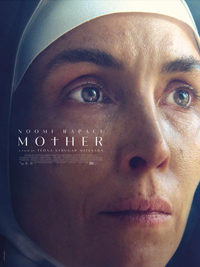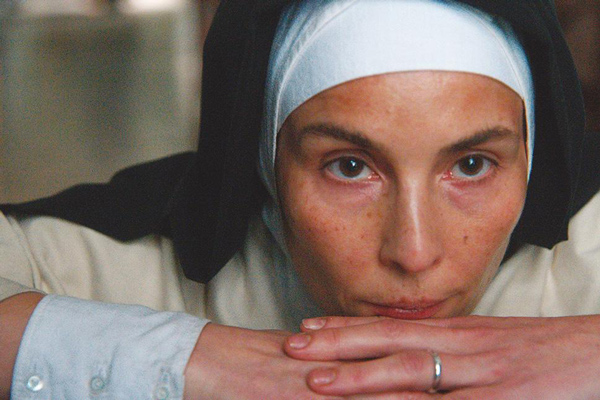Slack Narcissus: Mitevska Conjures the Psyche of a Saint
 There are a handful of contemporary historical figures whose accomplishments have superseded cultural critique thanks to the significance of their humanitarian contributions. Arguably topping this short list is Mother Teresa, the subject of Teona Strugar Mitevska‘s Mother, the director’s highest profile project to date. Considering they both hail from Skopje, it would seem a rather fortuitous match for Mitevska, ironically making her English language debut, nabbing Swedish star Noomi Rapace to portray Teresa during the week which should transform her from cloistered Mother Superior to leading her own order. The result is something of a snoozy biopic suggesting Teresa’s own rigidity nearly ruined all her best laid plans.
There are a handful of contemporary historical figures whose accomplishments have superseded cultural critique thanks to the significance of their humanitarian contributions. Arguably topping this short list is Mother Teresa, the subject of Teona Strugar Mitevska‘s Mother, the director’s highest profile project to date. Considering they both hail from Skopje, it would seem a rather fortuitous match for Mitevska, ironically making her English language debut, nabbing Swedish star Noomi Rapace to portray Teresa during the week which should transform her from cloistered Mother Superior to leading her own order. The result is something of a snoozy biopic suggesting Teresa’s own rigidity nearly ruined all her best laid plans.
Calcutta, 1948. Teresa (Rapace) received a message from God directing her to create her own religious order, one to directly address the poverty and various afflictions she witnesses, and which her current role as Mother Superior at the convent of the Sisters of Loreto inhibits her from practicing. She is patiently awaiting a letter from Pope Pius XII allowing her to leave the monastery and fulfill her calling. But Teresa is assured of her plans and has been preparing Father Friedrich (Nikola Ristanovski) for her impending absence, despite a lack of historical precedent from the church allowing women to leave their cloister. Sister Agnieszka (Sylvia Hoeks) has been groomed to be Teresa’s successor, a relationship some have called into question. Unfortunately, Agnieszka announces an unplanned pregnancy, sired by a man who died in her arms. Begging Teresa for assistance in securing an abortion from Doctor Kumar (Akshay Kapoor), Agnieszka becomes suicidal when it’s revealed her mentor has an unwavering stance towards abortion. When the long awaited letter at last arrives, Teresa must confront her own pride.

Despite Mitevska’s anachronistic artistic flourishes, particularly with the score and soundtrack, there’s little we can specifically deduce about who Mother Teresa is as a person beyond her tenacity in establishing an agenda to utilize the church’s humanitarian potential. A montage meant to reflect her psychological turmoil set to Hard Rock Hallelujah underlines the punk sensibility constantly recurring in Magali Gruselle and Flemming Nordkrog’s score, and such elements suggest comparisons to how Bruno Dumont approached reexaminations of Joan of Arc across Jeannette: The Childhood of Joan of Arc (2017) and Joan of Arc (2019) via modern musical signaling. But such elements more often than not seem incongruous with what’s going on, and Mother begins to feel a bit frayed, like a glossy, arthouse nunspolitation effort. Rapace wrings her hands with ascetic anxiety, hobbled by an accent which hints at origins from who-knows-where. Her Teresa seems close to stepping into zealotry, and if she hadn’t received the fateful blessings of the Pope, one wonders if she wouldn’t have transformed in Vanessa Redgrave’s Sister Jeanne of Ken Russell’s outrageous (and sublime, religiously contemptuous) Aldous Huxley adaptation The Devils (1971).
The questionable relationship between Teresa and Agnieszka suggests lesbian rumblings Mitsevska’s script (co-written by Goce Smilevski and Elma Tataragic) never quite dares to explore, and instead allows the film to examine her overriding allegiance to the most conservative dictates of the church rather than to the realities of her own gender and humanity.
Sylvia Hoeks looks divine in her destined descent into hysteria in a surprisingly frank search for an abortion, and one wonders if this wouldn’t have been more effective had Mitsevska really wanted to be punk and made a film more perversely critical of Catholicism—like Killer Nun (1973), except where the church assumes the exploitative energies rather than the women.
There are similar elements to Mitevska’s 2019 title, God Exists, Her Name is Petrunya, (read review) which is a more playful sendup of a woman defying masculine rituals, suggesting the incredibly serious approach to Teresa’s interiority is exactly what hobbles it. This is a woman who is merely a symbol, and whatever Teresa’s humanity, we need more than her presumed hardline against abortion to understand it. If she were prompted to relay her weaknesses to her superiors it would be something like “I care too much and sometimes bite off more than I chew.”
We’re left with the final images of Rapace having donned the garb which would define Mother Teresa, the sound of Anna Calvi singing Indies or Paradise through the end credits, which has a forlorn Karen O. energy. But as the loose-fitting, overtly generic title suggests, this is merely an impression, and doesn’t quite configure how Mother Teresa became a humanitarian symbol…nor does it dare to look into the depths of what else drives altruism, specifically when it’s fortified by religious institutions.
Reviewed on August 27th at the 2025 Venice Film Festival (82nd edition) – Orizzonti (opening film). 104 Mins.
★★/☆☆☆☆☆


